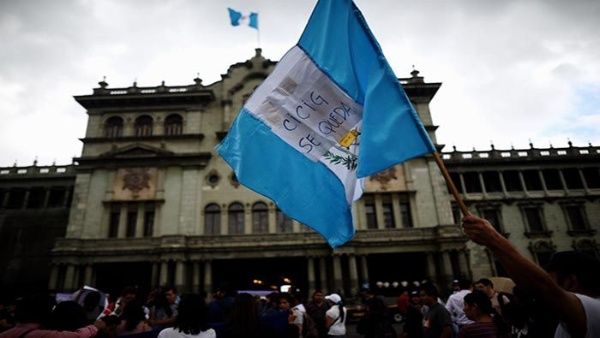29 de julio 2022

The Return of the Military

PUBLICIDAD 1M
PUBLICIDAD 4D
PUBLICIDAD 5D
An investigator from Human Rights Watch notes that the situation in Guatemala bears some similarity to that of Nicaragua

¿Había llegado a Guatemala
Juan Pappier, an investigator with the international organization Human Rights Watch, sees a “very serious decline” in respect for human rights and justice in Guatemala. He believes there’s a certain resemblance to the situation in Nicaragua, but with some shades of difference.
“Guatemala is in a time of very great decline in their enforcement of the Rule of Law in the country, with very few guarantees for the exercise of human rights, because today a great majority of their state institutions have been coopted [by the government],” Pappier asserted in an interview with EFE.
The investigator from the humanitarian organization added that in the northern Central American country “there’s no judicial independence”. Any prosecutor or legal functionary that dares to investigate the corrupt will – sadly – suffer spurious criminal accusations. Some of them have been arrested or had to go into exile.”
According to denunciations that former Guatemalan Attorney General Thelma Aldana [2014-2019] filed on May 20, at least 24 prosecutors and judges from the justice system have had to leave Guatemala since 2018, due to being active in the fight against corruption undertaken between 2014 and 2021. This tendency has increased in the last few months.
These court functionaries have faced judicial persecution from Consuelo Porras, Guatemala’s current attorney general and head of the Public Prosecutors’ Office. The US imposed sanctions on Porras in September 2021, accusing her of “obstructing” justice in Guatemala.
“This isn’t normal in a twenty-first century democracy, in a functional democracy,” Pappier, an Argentine lawyer, stated regarding the 24 exiled Guatemalan functionaries.
In effect, Chapter IV.B of the latest annual report of the Inter-American Commission for Human Rights included Guatemala in a list of countries noted for human rights violations. The list also included Venezuela, Cuba and Nicaragua.
Pappier believes that Guatemala could be following in the footsteps of the Nicaraguan government in terms of the corruption of the justice system, the coopting of the state institutions, and the violations of human rights. However, he notes that there are some differences between the two systems.
“In Nicaragua, we’re talking about a dictator or a family of dictators – Daniel Ortega and Rosario Murillo – that control all the power,” he clarified. On the contrary, in Guatemala “we’re talking about an oligarchical model of power” in the economic sense, where “there’s a set of powerful players who control and have coopted the government institutions,” Pappier explained.
In any case, he believes that “the example of Nicaragua bears some similarities to what’s happening in Guatemala. First, there’s the destruction of the Rule of Law – Nicaragua is a clear example of what happens when the democratic institutions are coopted.”
The second similarity, where the human rights watch investigator believes that “the comparison is valid”, is in reference to the international community.
“I believe that the international community made a mistake in Nicaragua, because they let time go by and didn’t react when the democratic institutions were being destroyed. The strongest recent reactions came when there were deaths on the streets of Managua, when there was blood on the streets,” he emphasized.
For that reason, Pappier feels that “it’s an error on the part of the international community to wait so long” and that “lesson” must be “applied” to Guatemala, in order to avoid the country’s “ending up in a situation like that of Nicaragua or Venezuela.”
The Human Rights Watch investigator sees transcendental importance in having “Guatemalans understand that without the Rule of Law, there are no” human rights.”
“It’s important that all Guatemalans understand that, including the business leaders who promote and support the dismantling of the country’s institutions. Tomorrow could bring a different government and if that government, for example, doesn’t respect private property – who are these business leaders going to run to?” Pappier concluded.
Between 2014 and 2019, there was an anti-corruption crusade in Guatemala that left over 200 politicians and elite big businessmen accused by the Public Prosecutor’s office under the leadership of former Attorney General Thelma Aldana and the International Commission against Impunity in Guatemala (Cicig) headed by Colombian Ivan Velasquez. Aldana is currently in exile in the United States, and Valasquez, was recently named Minister of Defense in his country.
This article was originally published in Spanish in Confidencial and translated by Havana Times
Archivado como:
PUBLICIDAD 3M
Agencia de noticias internacional con sede en Madrid, España. Fundada en Burgos durante la guerra civil española en enero de 1939.
PUBLICIDAD 3D